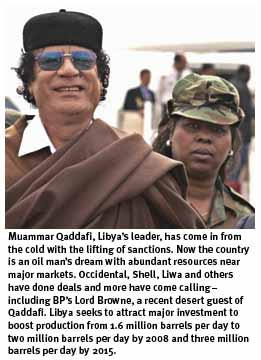| |
High oil prices, end of sanctions herald boom
Revenues leap 38 per cent, economy races and import tax set to go
Like other Arab oil producers, Libya is reaping new rewards as crude prices remain at historical levels and producers pump at full capacity.
But unlike the others, Libya is also reaping the benefit of the end of long-standing sanctions. This means the country can attract badly needed Western capital to push ahead with projects to tap its more than 39 billion barrels of crude oil and 1.47 trillion cubic feet of natural gas.
The leap in crude prices has already paid off in terms of economic growth and the once closed North African country is upbeat about an influx of massive investment from the United States, Britain and other countries. In trade, it appears even more ambitious as its target is to become a regional commercial hub by abolishing import duties from this month.
In the short term, such developments mean an end to previous economic and fiscal woes while in the medium and long run, Libya appears to be counting on the improvement in relations with the West and growing oil and gas reserves to open a new chapter in its economic and political history and achieve real progress.
 Libya earned an estimated $18.2 billion from oil exports in 2004, up 38 per cent from the 2003 revenues. For 2005 and 2006, Libya is projected to earn $24 billion and $25 billion, respectively, according to the International Monetary Fund and Libyan forecasts. Libya earned an estimated $18.2 billion from oil exports in 2004, up 38 per cent from the 2003 revenues. For 2005 and 2006, Libya is projected to earn $24 billion and $25 billion, respectively, according to the International Monetary Fund and Libyan forecasts.
Oil export revenues account for about 95 per cent of Libya’s hard currency earnings and around 75 per cent of the government budget. Over the past decade or so, Libyan oil export production and export earnings have been adversely affected by UN and US sanctions imposed in the years following the 1988 bombing of Pan Am flight 103 over Lockerbie, Scotland, in which 270 people were killed.
In June, 2004, direct diplomatic relations between the US and Libya were restored after 24 years. In February and April 2004, US economic sanctions against Libya were eased, eliminating travel restrictions and allowing investment by US corporations, including in Libya’s petroleum sector, as well as Libyan investment in the US.
After years of severe sanctions, Libya’s oil sector is in critical need of foreign investment, while US corporations are eager to return to the country, given its estimated 39 billion barrels of high-quality oil reserves as well as geographic proximity to western markets.
In 2005 and 2006, Libya’s real GDP is expected to grow by 6.5 per cent and 6.8 per cent respectively.
Low oil revenues in 1998 and 1999 forced Libya to adopt a more conservative fiscal policy and to limit public infrastructure spending to a few main projects, such as the Great Man Made River, a $25 billion project to bring water from underground aquifers beneath the Sahara to the Mediterranean coast.
The rebound in oil prices since 1999 and the suspension of UN sanctions have resulted in a modest improvement in Libya’s economic situation. On the other hand, higher oil earnings may also be removing incentives for Libya to restrain spending and to implement needed economic reforms.
In December 2004, Libyan leader Muammar Qadhafi reiterated his call for “liberating” the Libyan economy from its dependence on oil export revenues. In 2003, Qadhafi called for privatisation of the country’s oil sector and had pledged to bring Libya into the World Trade Organisation.
Having suffered from oil price volatility for decades, Libya continues its attempts at diversifying the country’s economy away from oil and towards natural gas, and generally has kept government spending under tight control in recent years.
Libya is expected to export around 1.4 million bbl/d of oil in 2005 and 1.5 million bbl/d in 2006, up from 1.3 million bbl/d in 2004.
Last month, Libya announced further measures
to diversify its economy by turning itself into a free trade zone and a transit centre between Africa and the West. Its Minister of Trade, Abdul Qadir Balkhair, said the country had decided to abolish customs duties on all imports except tobacco in a bid to spur trade and encourage re-exports.
|
|



